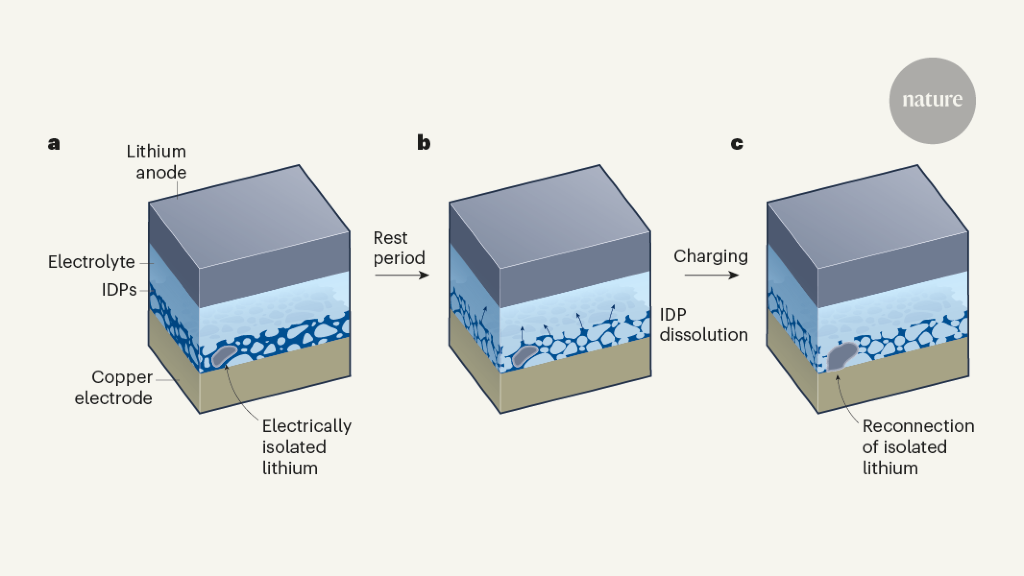Resting Lithium-Metal Batteries Restores Performance
Core Concepts
The author argues that resting lithium-metal batteries can restore performance by allowing electrically isolated lithium metal to reconnect to the anode after calendar ageing.
Abstract
Lithium-metal batteries, utilizing metallic lithium as the anode, are seen as the future of rechargeable batteries. Contrary to common belief that resting these batteries leads to degradation and reduced charge capacity, a study in Nature by Zhang et al. reveals that electrically isolated lithium metal can reestablish connection with the anode post-calendar ageing of discharged batteries. This finding challenges existing notions about battery performance and offers insights into potential restoration methods.
Customize Summary
Rewrite with AI
Generate Citations
Translate Source
To Another Language
Generate MindMap
from source content
Visit Source
www.nature.com
Resting restores performance of discharged lithium-metal batteries
Stats
"It is generally thought that ‘calendar ageing’ of these batteries — resting them without an applied current or voltage — results in degradation."
"This loss of battery capacity is typically caused by irreversible reactions occurring between lithium metal and the battery’s electrolyte."
"It can also be due to lithium metal becoming electrically isolated from the rest of the anode."
"Zhang et al. report that electrically isolated lithium metal can reconnect to the anode after calendar ageing of the discharged battery."
Quotes
Key Insights Distilled From
by Laura C. Mer... at www.nature.com 02-07-2024
https://www.nature.com/articles/d41586-024-00229-y
Deeper Inquiries
How might this research impact the development of future battery technologies
The research findings indicating that electrically isolated lithium metal in discharged batteries can reconnect to the anode after resting could have significant implications for the development of future battery technologies. This discovery suggests that the degradation typically associated with calendar ageing in lithium-metal batteries may not be as permanent as previously thought. By understanding how these batteries can potentially recover capacity through reconnection of lithium metal, researchers and developers can explore new strategies to enhance the longevity and performance of such batteries. This insight could lead to innovations in battery design, electrolyte composition, and maintenance protocols aimed at mitigating irreversible reactions between lithium metal and electrolytes.
What implications could this discovery have on current practices in battery maintenance and usage
The discovery that rested lithium-metal batteries may regain lost capacity by reestablishing connections within the anode has significant implications for current practices in battery maintenance and usage. Traditionally, it was believed that calendar ageing irreversibly reduced a battery's charge-supplying capability over time. However, this study challenges that notion by suggesting a potential pathway for recovering lost capacity through reconnection mechanisms. As a result, this finding may influence how manufacturers recommend maintaining and using lithium-metal batteries. It could lead to revised guidelines on storage conditions, charging patterns, and cycling frequencies to optimize performance retention over extended periods.
How does this study challenge traditional views on battery performance and aging
This study challenges traditional views on battery performance and aging by presenting evidence that contradicts the common belief regarding irreversible degradation during calendar ageing of lithium-metal batteries. The conventional understanding was that resting these batteries without an applied current or voltage led to permanent loss of charge supply due to detrimental interactions between lithium metal and electrolytes or electrical isolation within the anode structure. However, Zhang et al.'s findings suggest a more dynamic process where electrically isolated lithium metal can reconnect post-resting period, potentially restoring some lost capacity. This challenges established notions about inevitable deterioration during downtime periods for rechargeable cells like those utilizing metallic lithium as their anodes.
0
